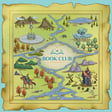Become a Creator today!Start creating today - Share your story with the world!
Start for free
00:00:00
00:00:01

Walkaway by Cory Doctorow Book Club
What happens to a post scarcity society when the fear of death is removed? In our final discussion for our Solar Punk season, Caroline and Carly ponder how curing death can help create a better society. They talk about some of the tradeoffs of living a completely free life with no possessions versus a wealthy life where your possessions can be taken away.
Get your copy of the book using our affiliate link here:
Walkaway by Cory Doctorow
Subscribe to our email newsletter on Substack: https://www.bookclubpod.com/
Transcript
Introduction and Overview
00:00:00
Speaker
Hello listeners, today we will be spoiling Walk Away by Cory Doctorow and any other books we have read this season.
Themes of Passion and Collaboration
00:00:10
Speaker
The best way to be superhuman is to do things that you love with other people who love them too. The only way to do that is to admit you're doing it because you love it. And if you do more than everyone, you're still only doing that because that's what you choose.
Critical Analysis of 'Walk Away'
00:00:28
Speaker
Welcome to the Book Club podcast. Today we're discussing Walk Away by Cory Doctorow, the last book in our solar punk season. I'm Caroline, and I love this book for its discussions of cooperation, of building together, of the difficulties inherent in doing that and how they can be overcome. But I did not like that it extended the narrative of freedom from want into freedom from death.
00:00:55
Speaker
I realized as I was reading this that I do not really like stories about conquering death. I'm Carly, and I think I agree with you on the book. I think we'll have a really great discussion, but I did struggle a bit with the way that the story was paced. So it made it a little bit difficult to read sometimes. There are so many interesting things to talk about in this book, so I'm looking forward to
Dystopian Setting and Walkaway Lifestyle
00:01:19
Speaker
our conversation.
00:01:19
Speaker
Speaking of, what is the book? Well, in a world roughly contemporary with ours, America has been destroyed by the mega wealthy in this book called The Zotta Rich and various climate change disasters. Large swaths of the country have been abandoned by both people and the government. These empty areas are then populated by the walkaways.
00:01:42
Speaker
people who walk away from normal life, which in this book is called default, as in default reality. As we start the book, our characters are Hubert, Seth, and Natalie. They have met and become friends in default and decide to interwalk away together.
00:01:58
Speaker
At first, they arrive with heavy backpacks full of stuff so that they can be prepared for any eventuality. People make fun of them and call them schleppers. But then all of their stuff is stolen while they're in the onsen, which is a shared bath or spa, in a B&B. At that B&B, they meet a woman named Limpopo, who shows them around. She embodies the walkaway lifestyle as a continual process of improvement.
00:02:25
Speaker
At the Walkaway B&B, things operate according to a post-scarcity gift economy. There's no money, no credits, no awards.
Technological Innovations and Challenges
00:02:34
Speaker
If you and a group of people want to do something, you do it together by consensus and hard work. There are arguments and debate, and if people don't want to work with someone who's being unreasonable, they walk away.
00:02:43
Speaker
A lot of the infrastructure is created and organized by code and made possible by 3D printers. For example, with a few earth-moving vehicles and sufficient input for the 3D printers, anyone can start putting together buildings, clothes, tools, anything. The plans are freely available and the 3D printers themselves are easy to build. The net or code even manages the house or building created, for example by alerting residents to tasks that need to be done.
00:03:09
Speaker
Though Limpopo has no official status and claims she doesn't want any official status, she is the heart of the BNB because she is put the most work in. A group led by someone named Jimmy, who has a grudge against Limpopo, commander the BNB.
00:03:25
Speaker
and announced that they're going to institute a system of rewards for people who contribute. It's going to be a meritocracy, in other words. Limpopo walks away, followed by most of the community.
Consciousness Uploads and Existential Questions
00:03:37
Speaker
They, in turn, build a new BNB. A couple years later, Natalie, now going by Ice Weasel, finds a group of walkaway scientists who are working to cure death by uploading a human's consciousness to the web. That group is attacked and scattered
00:03:53
Speaker
but not before achieving success in uploading a recently deceased scientist named Diz to full consciousness. Thus, in addition to being a post-scarcity economy regarding objects, the world is now post-scarcity regarding death because there is no more death. Because of that, the threat of force does not work.
00:04:15
Speaker
Everyone, including the walkways, can simply ensure that their consciousness is uploaded, and then in the event of their physical death, they will be able to return as a simulation. The walkways are attacked again. Ice Weasel is kidnapped in the aftermath and taken prisoner by her father. The walkways flee yet again when a military force comes to attack them. Seth, Gretel, and Tam were returning from a supply delivery and saw the military coming so they could warn the group.
00:04:41
Speaker
Limpopo helps Jimmy, who lags behind because of recent injuries and et cetera joins them, et cetera was formerly Hubert. Then they are attacked. Jimmy and et cetera are murdered and Limpopo is kidnapped. Ice Weasel makes a deal with the guard to help her escape her father's house. Limpopo gets sent to prison under a false name. And the walkway successfully bring the et cetera sim online. After a time jump of many years, we learned the walkway movement has become mainstream.
Community Dynamics and Conflicts
00:05:10
Speaker
Our walkways, other than Limpopo, are living together in a home in Indiana with the simulation of Limpopo as a house spirit. Ice Weasel and Gretel have two young sons. Then they get a call from the embodied Limpopo. She tells them that the prison where she lives has collapsed and the inmates are running it because the prison, like many other institutions of default over the last 20 years, has fallen apart as both the inmates and the people keeping it together, the guards.
00:05:39
Speaker
rebel and refuse to do so anymore. Ice Weasel, Gretel, Tam, and Seth, along with the simulation of Hubert, et cetera,
00:05:47
Speaker
and the two young children travel to Limpopo's prison. They start to build a community there again under walkaway principles when a Zada military force working with Ice Weasel's father attacks. Ice Weasel and the others escape while Gretel and Limpopo lead the defense. Ultimately, the walkaways defeat the military by finding close family members of soldiers who are walkaways and urging them to recruit military members one by one.
00:06:13
Speaker
After another time jump of many decades, Ice Weasel wakes up in her newly cloned body greeted by, et cetera, in a cloned body. He invites her to their spa and tells her all their friends are present as either simulations or clones or will be soon. The book ends on a note of reunion. There's a lot of ground to cover in this book, obviously. I think there are three main societies. There's the default society, there's walk away, and then there's the
00:06:41
Speaker
walkaway society once Sims have been discovered. My question for this book, as I was reading it, I was sort of feeling, why can't we just stay in walkaway world and talk about that? Why did the book have to continue into the conquering of death? And so my question is, what, if anything, does the creation of either an ideal society or walkaway society have to do with conquering death?
Solarpunk Comparisons and Ideals
00:07:07
Speaker
I mean, is one a natural extension of the other?
00:07:10
Speaker
is conquering death somehow required? How are these related? Yeah, it's a real contrast from all the previous books that we've read because, I mean, I think back on Psalm for the Wild built, we talked about the robots who chose mortality. They could have chosen to perpetuate themselves and repair themselves and essentially be immortal, but they chose to have a life cycle and then their parts would be reinstituted into new robots with new identities.
00:07:39
Speaker
And we kind of decided that they did that to be closer to nature. And also in that book, we get the story retold from true events that happened with Yellowstone about reintroducing wolves to Yellowstone and about fear and how fear of death is good to keep things in balance. So, I mean, are we willing to say that this book breaks from the solar punk genre because it's not about keeping things in balance.
00:08:08
Speaker
So I think I agree that most of the other Solarpunk books, as part of their fundamental philosophy, involve embracing natural cycles. Earth abides, for example, ends on that note of embracing the natural cycle that may even include the sunset of man or of civilization. I think The Fifth Sacred Thing also has a lot of strong notes about embracing natural cycles. The book you just mentioned does as well.
00:08:37
Speaker
So yeah, I think this is a break with Solarpunk in one way. I can also see an argument that it's an extension because all of the Solarpunk societies have done away with some sort of fundamental inequity and fear, right? They've done away with want in most occasions. They've done away with hunger. Many of them have done away with violence as well.
00:09:02
Speaker
all of which people may also say are part of the natural cycle or part of nature. And so maybe, in some ways, this is just an extension of it. Why not also try to get rid of death? Maybe there is a similar idealism for both. So I don't know. Now I'm thinking about the idea of how do you have faith to build society that will be better for the people who come after you, like healing past wrongs and building something better and having the faith that the people who come after you will also continue that vision.
00:09:32
Speaker
And that seemed to be a very important part of Solarpunk that I didn't expect, like a spiritual aspect. And in this, if these people are living, essentially they're living forever in different forms. And so the future they're building is for themselves. But on the other hand, there are a number of examples
00:09:52
Speaker
of really heartbreaking sacrifice in the walk away movement. I mean, both they talk about previous walk away pioneers who've been imprisoned and killed. And then Lompoper herself is sent to prison for two decades. And she seems to have no regret for what she did. And then, you know, before the Sims are created, everyone who is participating knows that they might be killed or jailed. So I wouldn't go so far as to say the removal of death removes
00:10:22
Speaker
nobility to their actions because they were willing to put their lives and freedom on the line even before that.
Leadership and Social Structure Contradictions
00:10:29
Speaker
But I do agree it leaves me feeling that somehow the overall project is a little less worthy, frankly. Yeah. Let's talk about Limpopo because it seems like she is the real epitome of walk away before the conquering of death. And so she's been integral to creating this BNB. It's a great walk away spot that
00:10:52
Speaker
supports a lot of people and has a very, can we say egalitarian? It's hard to say egalitarian because no one is tracking who's got what and who's doing what, right? So how do you say that's egalitarian? But she's really fascinating because I think at one point she says there's no ledger, but there is a ledger. Like she knows that she has done the most work in
00:11:14
Speaker
crafting the code that shapes the building. And she's put in the most sweat equity. But she's also very dedicated to the idea of not keeping track. And she becomes admired. She becomes an unofficial leader of the walkway movement. She has a very long reputation, even in default, for what she's accomplished. I'm getting stuck on this. It seems like a contradiction. I don't know where I was going with that.
00:11:40
Speaker
So the contradiction is that she's proud of being the one who contributes the most and in many ways has the most merit, while also openly saying nobody should be judged on their merit. Right? Exactly. Yeah. Yeah. Yeah. It's not about the merit. So that moment when Jimmy and his group take over the first B&B, they say to her, look, you've done the most to build this. So in our new gamified system, you have a lot of credits. Like you are a leader.
00:12:09
Speaker
So it's not like they were physically taking it from her. They were just changing the way it would be governed. You can track in the code who's done what, right? So that's what they do. Right. They could look at the code and they could say, you've done so many recommits and shaped so much of this building. I think he even says, we'll give you three years of credit. You don't have to work at all because you've done so much already. Yeah.
00:12:33
Speaker
And she doesn't want that. Yeah. And she says, all right, you can have it. And she doesn't say to her the rest of the community who's with me. She just she just like she's willing to walk away even if she's walking away completely alone. Right. Right.
00:12:50
Speaker
Like they've been out, I forget what they were doing, some kind of, uh, some kind of resources reclamation or something. And then they come back. And so they have like their packs that they were using and the clothes on their back and like, that's it. And it's sort of, as mentioned in the summary, walkaways do not, they don't carry a bunch of supplies with them. They trust that they will be able to provide when they're needed or that other people will help them both. Right.
00:13:28
Speaker
That moment struck me so hard when I read this because that would be so hard to do. It's also in contrast with a bunch of the other Solarpunk books that I think describe my ideal society as one where your labor is your own and you have the time and freedom to create really valuable things that are yours.
00:13:41
Speaker
Right. And so she's willing to leave with nothing. She's willing to walk away from what she has built.
00:13:50
Speaker
Here, all you're promised is a chance to always start over and have your basic needs met. Even something you put all your labor into, you might have to walk away from. Yeah. So she says in this moment, I sweet soul is still new to walk away and is like, how are you doing this? And she says the thing about starting over is that you get to see the thing grow. Once it's built, all you get are tweaks like new paint and minor decorations, seeing a piece of blasted ground and a pile of scavenge leap into the sky and become a place.
00:14:19
Speaker
having its software get into you and you get into it. So wherever you are, no matter what you're doing, there's something you can do to make it better. That's amazing.
00:14:27
Speaker
They're also on drugs when they're having this conversation, so I wonder how much that influences this. But it sounds beautiful and ideal, but on the other hand, it sounds like a young person's society. What happens when you physically can't do the labor? I like the idea of being able to build up a place of safety and security
00:14:50
Speaker
in your productive years so that when you become less productive or if you become sick or or injured or whatever you have some some foundation to provide for yourself. We've talked in a lot of the solar punk societies about how to provide that security and a lot of the societies to their credit provide that security without it necessarily being you know an individual retirement account that someone is building up.
00:15:14
Speaker
But here, there's none of that. And it also occurs to me, there's no way to get it. And there are people who will just be fundamentally unsuited for this life, either because they cannot work that way, you know, that hard, that repeatedly, or because they maybe are not social in this particular way that is required. So I would say that the society, though it does a better job than default, I'm not sure it does a great job of providing for everyone's needs.
Philosophical Commitments and Societal Ideals
00:15:43
Speaker
i mean i guess the trade-off there is that it's total freedom right yeah and also like i kind of got tired of how many times they're attacked like they're attacked so many times and have to go somewhere else and they have to deal with death and injury of people that they care about and then move on and restart over that's a lot yeah
00:16:02
Speaker
So maybe Ice Weasel is a key to this too because she gets kidnapped by her father. She has the opportunity after multiple times of her walk away communities being decimated. She has the opportunity to go back to default. Her father is Zotta rich. You can imagine that being that rich, she could do whatever she wanted if she accepted the default. I mean, it's never a question that she will. She never is tempted by it, it seems.
00:16:27
Speaker
true but i could see someone being tempted by that that like really what can she do and walk away that she can't do in default because she has everything in default she has everything she needs so something related to this one of the good things but also the frustrations about this book is it kind of reads
00:16:46
Speaker
like a debate me bro, trying to convey a philosophy as opposed to characters, right? Because what we're talking about with Ice Weasel here and with all of them is that they clearly have a deep emotional, philosophical, spiritual commitment to their ideals.
00:17:04
Speaker
that doesn't really come across. There's a lot of defensive type talk, right? Like explaining why it works or why it's okay. But you don't necessarily get the feeling of it for any of these characters, the way you do in a lot of the other Solar Pump books.
00:17:19
Speaker
But they do make it clear that they're motivated by ideals. There also is a phrase that's repeated frequently, the first days of a better nation. So maybe part of their comfort with this very insecure life is that they really believe it is building something better in the future. And so maybe this generation lives with that insecurity of walk away.
00:17:41
Speaker
maybe future generations, there's no Zotta Ridge to attack the walk away community, so they get to flourish and grow into something stable. But that's never said, right? That's never articulated.
00:17:51
Speaker
I admire Ice Weasel's clarity. Her father comes to her while she's being imprisoned in his home and says, let's be reasonable and have a conversation. She's like, reason went out the window when you kidnapped me against my will and held me against my will. She's just like, no, I really admire that.
00:18:13
Speaker
And then she doesn't want her inheritance. And so it's enough to tempt the guard. The guard is willing to take all of her money and just let her free, which was, I mean, that was really smart. Does that show us an insecurity in the default? Like that seems to be the key difference. Like in walk away, you can take everything I have and it doesn't change anything about myself or the lifestyle that I'm living. But that's not true in default.
00:18:43
Speaker
Right. There are things that can be taken and will change your status forever. Yeah, that's a good point. There's a real insecurity and default reality too. I think there's also a connection here to a phrase they use repeatedly in the book, which is snowflake or snowflake status. And in this book, it's meant
00:19:04
Speaker
to refer to people thinking that they are special, right? The little problem of subjective reality, which is that everyone thinks they're the main character. And there's a lot of talk and walk away about, you have to get over that. You have to recognize that you aren't a special snowflake.
00:19:20
Speaker
Is that maybe part of what ice weasel slash Natalie is doing when she gives up the money? And she's saying, I'm not going to I'm not special enough to have this money. And it doesn't and or it also doesn't make me special. It's not valuable. Or is that a stretch? I can explain it a little better, which is that I think a lot of people will not a lot, but some people
00:19:42
Speaker
face this essential decision, which is there's inequality and inequity and injustice in the world, but I, in particular, am doing okay. I'm at the top of the heap in a number of ways, money, privileges, otherwise. And they're
00:19:59
Speaker
comes to be a disconnect between recognizing that overall injustice and the fact that you are doing well. And I think on some level, people think that they're special. And so it's OK for them to have those privileges and good results from the inequity. I think at some level, that's where the justification comes in, is I'm special in some way. I either deserve it or other people would use it worse or something like that.
00:20:27
Speaker
Right. Well, even Etc. has a complaint in the first B&B. He's like, this place is too finished and I can't really have an impact. And I don't know that we get any clear answer. Is that anti-walk away? Right. And to be clear, he's complaining because every way that he tries to contribute, it doesn't particularly matter. If he messes it up, someone else will come in and fix it.
00:20:53
Speaker
or the code will correct him and tell him how to do it right. And if he does it right, that's great. But anyone else could have done this particular chore too. So he doesn't feel special. But he does go eventually build Zeppelins again. At the beginning of the book, he's recovering because he was part of this big Zeppelin economic boom that just crashed. And so he's kind of lost. So he goes and he builds a Zeppelin again in local ways. He does find his special thing again.
00:21:21
Speaker
Does that make him a special snowflake? I mean, it's regularly used to think about the rich have resources and then they disperse those resources. They don't need to charity. And it's like, yeah, but why do you have the right to decide which charities are deserving of this wealth?
00:21:39
Speaker
That reminds me of Ice Weasel when she's learning about them conquering death. She has this like moment of disorientation and she's like, they're winging it. She says, how can these people who are just winging it, how can they decide what civilization will look like?
00:21:57
Speaker
And it's like, well, but who else gets to decide, right?
Immortality vs. Unimportance
00:22:00
Speaker
And one of the main arguments for the walkaways to figure out how to conquer death is because they know the Zadas are working on it. And if the Zadas find a way to conquer death, then they will keep that from the majority of people. They will keep that as a skill for themselves. And the walkways don't want that to be limited to a few people. They want it to be available to everyone.
00:22:23
Speaker
Right. So the walkaways sort of buy into the arms race aspect of it, which is interesting because elsewhere in the book, there's plenty of statements to the effect of, you know, you choose the world you want to live in by how you act. Uh, and yet when it comes to, to this arms race, they, they don't do that, right? They don't make the, to me, what would be the idealistic decision and instead they, you know, continue in this arms race. Yeah.
00:22:51
Speaker
Do you think there's a tension between recognizing one's own relative unimportance and seeking immortality? Yeah, I think there's a contradiction. You have to think, in my opinion, you have to think you're a bit of a snowflake to believe you're real special to say, I should live forever. Yeah, it seems to be the thing in walk away that they're doing that is not guided by all of the other walk away principles you've just learned about. Well, actually, I think there's another thing that
00:23:20
Speaker
very different from all the other Solarpunk books. And that's their reliance on code. I don't think they use the term artificial intelligence, but essentially that's what they rely on. That instructs them how to create the buildings, that instructs them how to divide up chores. They rely on it in all sorts of ways. They're replaced human skills, know-how, and leadership.
00:23:47
Speaker
And that is different from all the other books we've read. I think in the other books, there's been a celebration of skills of humans having skills and developing them. They take almost like an artisanal approach to labor.
00:24:02
Speaker
Whereas this book seems to take more the approach that, you know, that sort of labor and skills and education is kind of a waste of time. It would be best if we could outsource it. Right. And that makes sense that that would be necessary for post-scarcity, like just thinking about building a building.
00:24:19
Speaker
you know, now you need someone who is trained and knows how to like, like, you need a structural engineer, if you have someone with a specific skill set, then that automatically gives them some kind of authority and makes them distinct from everyone else. And so I don't think you could have this kind of society without freely accessible knowledge, like, and, you know, I don't know, I don't know that I would want to be in a multi-story building just scrapped together from
00:24:47
Speaker
by like a bunch of amateurs according to AI. Like that, AI is not there yet.
AI, Code, and Human Interaction
00:24:56
Speaker
So. I mean, it is really the central MacGuffin of the book that makes everything possible, right? Both that they have this 3D printing technology and the feedstock is incredibly available and cheap. Right. And that they have all this AI that can direct even the average person to do something like construct a building. Right.
00:25:17
Speaker
he'd really have to spend a lot more time talking about how they structure society to overcome confrontations and disputes and how leaders are chosen.
00:25:28
Speaker
would probably need leaders or at least respected individuals with limited authority, right? He gets to sidestep all of that because of those two conceits. So the first BNB, we have people, and Limpopo talks about the dance between the human and the software, that there's a dance going on there.
00:25:48
Speaker
One thing that I thought was really funny was this idea that having it all in the code allowed people to avoid being embarrassed if they made a mistake, like no one cared. I thought that was really fascinating. Like, yeah, I would love to see that in our society. Is it is a mechanism that kind of eliminated the sort of ego hit when you make a mistake? It's like, oh, no, we can just pretend like that never happened and move on. Yeah. And the way that worked was that someone would be
00:26:16
Speaker
You know, building the foundation for a house and the code will notice that they've done something wrong, but it'll just, you know, either suggest they do something else or it'll alert someone else. Not that you made a mistake, but that, Hey, so-and-so is happening. Let's all go help out. Right. In a very neutral way. And so that avoids the confrontation of someone.
00:26:36
Speaker
you know, with the greater skill and authority saying, hey, you're not doing that right, let's do it otherwise. So it's like a symbiosis. The people, the community is living in symbiosis with code, with AI. And then, so is the natural next step then to upload your consciousness to AI. So when a consciousness is uploaded, the first one diss,
00:26:56
Speaker
has a lot of work to do to conquer this existential crisis of being disembodied and figures out ways like they talk about like setting parameters to prevent
00:27:14
Speaker
that crash. And so there she's programming herself, essentially, this has like, no one else is really capable of manipulating the software. And we just has to do it herself to figure out like, how do I program the limits of my own personality, so that I don't have an existential crisis and am capable of living as a disembodied consciousness on on a computer, which to be explicit, the removing
00:27:40
Speaker
the capability of having an existential crisis, but still choosing to believe that whatever remains is a coherent and complete personality.
Cognitive Liberty and Sensual Experience
00:27:49
Speaker
Right. And at first that really bothered me, but then they also talk about like using drugs a lot.
00:27:57
Speaker
Like here, so this says something about freedom. She says you haven't known freedom until you've experienced cognitive liberty, the right to choose your state of mind. And at first that stood out as like something completely alien. But then like, that's what we try to do when we practice yoga or meditate or
00:28:17
Speaker
drink coffee to make us productive or have alcohol to help us relax. They do take a lot of drugs in this book. It's very common to just like, oh, this drug is helping. What's the one? It's called meta that helps them feel friendly and cooperative with each other. Yes. And there's a variant of coffee to be productive. So that statement from Diz is very interesting because it's phrased
00:28:46
Speaker
you know, the right to cognitive liberty, as opposed to just the ability to choose your cognitive state. I mean, you would only, that could only ever be a right, meaning it's guaranteed in some sort of simulation. It would never be possible.
00:29:02
Speaker
for embodied people, not entirely. How would you even know? Like, how would you even know that it's actual liberty you're constraining yourself to assume that it's liberty or to accept that it's liberty in both the sim state and the embodied state, right? Oh, like in the embodied state?
00:29:24
Speaker
Absolutely. Like that whole, we were just talking about special snowflake-ness. You think that your way of doing things is the best way or like, you know, your main character syndrome or whatever, that you can set that frame of mind and go through life and never be corrected. Right. And, and if you're never corrected, then maybe that means you've actually not done too much harm with this state of mind. And so who cares? Like, why do you care if you're in a state of mind that's different? But, but, or, you know, again, like with yoga and meditation,
00:29:54
Speaker
That's all about focusing on your body and mind and feeling like you're not just reactive. But it doesn't work 100%, right? I mean, you know, tell me if you're different from me on this, but everything that I've ever used to try to change my cognitive state from coffee to make me more alert and productive to therapy,
00:30:21
Speaker
to impact my emotions and my responses to meditation. Yeah, it all has an effect. That effect varies on a daily and minute by minute basis, you know, because of other factors, often because of my own embodied self, right, being subject to other requirements. But also,
00:30:41
Speaker
we just don't have that much control over how we feel and think. But is that different from what Dis is describing? Like, I think at one point, she talks about that moment right before the crash, she feels all the emotions. Is that what she says is better than sex? There's a moment later on where she removes some of the parameters for some reason. And she describes that feeling as better than sex as
00:31:07
Speaker
I think she uses a metaphor that it's like taking a roller coaster through reality, which was interesting because it sounded intense, but not enjoyable. Maybe that's me.
00:31:20
Speaker
But so how how is that different? Like the control has different mechanisms for dis as a sim. But I don't know that it's that the effect is different, that there's a there's a certain level of control she can have over her state of mind. And then when she lets go, there's and there's no control. It's all very, but when she exercises the control, it works 100%. She can choose to release control and have a different experience. But it seems from what she said that
00:31:49
Speaker
as a sin, she can architect her own experience of anything. Yeah. I wonder too, if she finds enjoyment in that because she actually can't find enjoyment in sensual pleasures. Yes, which seems like a huge loss. I will also say this whole conversation makes me so uncomfortable because on the one hand, I want to take a strong idealistic stance
00:32:14
Speaker
that we are embodied human beings and there is beauty in the fact we can't control our reactions and our experiences 100%. On the other hand, if we looked at my day on an hour by hour basis, I am so much trying to control my experience and mood and reaction and intellectual awakeness level. There is so much conflict between
00:32:41
Speaker
What I find to be a beautiful idea and what I actually spend my energy on, which is trying to shape my.
00:32:47
Speaker
experience and self in so many ways. So I'm so uncomfortable. I will say there is a moment, I'm going to count this as part of our pattern with Solarpunk. There is a moment where Limpopo is outside and enjoying nature. It's winter in Canada, so it's not the same as like standing out in the sun and taking a deep breath and enjoying the sunlight. And there's no breeze. We didn't get the breeze with spiritual qualities like in all the others.
00:33:15
Speaker
Right, but she does, but she does take a moment to just like, let her senses absorb the natural surroundings. And then she has a conversation with one of the scientists, Sita, and Sita's like, Oh, you're going to make some argument about how we can't live without our bodies because we won't get these moments of beauty. Right? Right. I think they get interrupted because I don't think they that they've had a conclusion. There was definitely not an answer. It was right. We got interrupted or they gave an answer and I was just like, that's meaningless because
00:33:43
Speaker
I remember that section, I was unimpressed.
00:33:46
Speaker
Right. No, it's like you called it like that debate me bro. But in that moment too, she also talks about, oh, we're going to start cloning. There's already people researching how to clone. And so we'll put your consciousness back in a new body. So it's like the disembodied computer existence wasn't their final goal. Like to begin with, it was always to like, and then you'll have a new body, which happens at the end of the book. Do they specify that the bodies are grown in a vat?
00:34:15
Speaker
Because otherwise, whose body, right? Well, if you have a genetic code for a person, can you essentially 3D print their body if you have their genetic code? I think that is what they do. I think you're right. I have the same question. Did this person give you permission to do that with their body? None of that is addressed, obviously.
00:34:39
Speaker
Well, they do have those dead heads. I don't know that we got a satisfactory ending to that because there were two soldiers who came and attacked and they managed to defeat them and then they put them on ice. They like copied their consciousness, but they didn't try to boot them up and like just had their bodies in stasis. And it's like, is this a war crime? Yeah, it was kind of done as a test, right? Yeah, morally questionable for sure.
00:35:08
Speaker
because they didn't want to kill the soldiers because they, you know, they agreed that murder is bad. So they just put their bodies in a comma state and put their brains like simulated their minds. So that could be stored somewhere. That is so much worse than just killing someone. Yeah. I mean, because they didn't consent to it, right? Right. I don't remember what happened to them eventually. I don't think it was explained. I don't remember either. Is there anything else you want to
00:35:36
Speaker
Talk about before we get to genre themes. Well, the bodies, like there were these very detailed descriptions of sex between characters. And there's a moment that seemed kind of out of place where Seth is thinking about Tam and his past, where he's a douchebag to some girl. And he's like, well, you don't have a penis, so you can't satisfy all of my sexual needs.
00:35:58
Speaker
And he's like, yeah, that was douchey of me. But he loves Tam because Tam is a woman with a penis. And I was like, why is this in here? But then when I think about the other like descriptions of sex, like Limpopo was burned in a fire in a previous attack and she has scar tissue that she's kind of sensitive about. And then when she has sex with, et cetera, the first time he touches it and it's a different sensation than the rest of her skin. And she notices that. Or like Ice Weasel is constantly thinking about Gretel and her bulky body and like
00:36:28
Speaker
her large arms and it's the very physicality of them and then here are these people who all eventually become disembodied sims and it's like I don't know that it was in that argument but it's definitely there's definitely a case to be made from this book that like leaving the body is no small sacrifice so yeah well I have a question about
00:36:51
Speaker
If you leave your body, you're a sim, and then you are put back into a body, could you really enjoy sensual pleasure in that body just the same degree? I mean, wouldn't it feel like you were wearing a full body glove or something? I'm not talking about just the physical sensation, but it wouldn't feel like yours. So how could you enjoy the sensuality of it? I mean, I think if we accept the reality that is described in the book, that's not an issue in this book.
00:37:20
Speaker
Yes. There are a lot of things like that in his book. Yeah. I mean, I don't know. I want to know, Limpopo, does she miss her burn scar when she has a new body? That's a good question. I also want to know, did Tam have a clone as an ex-body, if that makes sense? Did she choose a cis woman's body? Because she's a trans woman. Not mentioned, right?
00:37:46
Speaker
Yeah, and if she did, would that mean Seth didn't want to be with her anymore? Oh, yeah. How would she feel about it? Because you have a lifetime in your body. However you feel about your body in an evaluative way.
00:38:01
Speaker
You have a community of feeling with it and experience that is very valuable. Yeah. Well, I'm pleased that we're both skeptical about becoming Sims of ourselves. Limpopo as the house spirit, I thought was degrading and disgusting. I hated it. Yeah. I hated it. Yeah. She's basically the house nanny. That's how they use her Sim. And oh, I did want to talk about that because that's another example of how they use code to substitute for tricky human issues.
00:38:30
Speaker
So the house will light up certain areas when they need some sort of maintenance or routine chore attention. Like I assume a gentle light shines on dirty dishes or whatever it may be. Okay, that's fine. But wow, what a way to sidestep the really human issue of who decides what chores get done, in what order, at what time. Like that's the essence of how we live together and how we cooperate.
00:38:59
Speaker
And I guess if you have the right, you know, uh, code slash SIM, you can just sidestep all those potential negotiations. Well, I'm sure Limpopo writes the code to set those priorities and someone else can come back and rewrite the code to set different priorities. I would guess at that, but taking Limpopo in the glorious unleader that she is at the BNB and then just. Convert her into a house spirit. I hated it. I can't tell you what I hated it. Yeah. Yeah. I mean, that's another thing about being a SIM. You are limited.
00:39:29
Speaker
Sure, you can travel anywhere that the net exists because you travel through the net, but in terms of traveling in physical world, you're limited to, you know, whatever device you inhabit and whether or not someone chooses to carry that around. So to me, that's a real loss of freedom. I guess it's a trade-off, one type of freedom for another. Yeah. Speaking of conscious trade-offs has been a long theme of Solar Pump.
00:39:54
Speaker
You give up in the other books a certain type of society or certain types of creature comfort, certain types of complexity in order to have a society where everyone's needs are met, for example. And then here in this book, we just named one of those trade-offs, but then also in Walk Away, when Hubert, Natalie, and Seth have had their stuff stolen, when Popo tells them, you know, the people who use this place decide that they would rather be
00:40:22
Speaker
robbed than surveilled. So I would rather be robbed than have to go to the effort of treating other people as suspicious and guarding my stuff, which I respect that trade off.
Redefining Community and Identity
00:40:33
Speaker
Yeah. So redefinition of family and community. Yeah. I mean, Natalie leaves her family and forms a new one. Tell me more what you think about the redefinition of community. Well, in this book, there are no leaders, you know, there's no merit. Some of the other books had more
00:40:49
Speaker
ornate social structures, I mean, ecotopia in particular had, I think it had elected officials, it had, you know, people with defined jobs that they returned to and therefore authority based on that.
00:41:03
Speaker
This book doesn't. This book does away with all of that. Yeah. Freedom. What is freedom in this book? There's no want for food or medicine. There's no fear from death for the Sims. Is it freedom to flourish and be one's true self that like the true self is really tricky. Like we don't really know if they're, they are true selves. The one example we get, cause we get a really clear picture of Limpopo as an embodied person. And then Limpopo is a Sim and I don't think that's the same person. It's not the true self. Right. I mean, that's interesting though, cause.
00:41:33
Speaker
For me, so many of the benefits of the other societies that have been described are that because basic needs are met, people can flourish in unique ways that they would never get to in default reality. And I take part of flourishing to be developing your unique self in the ways that are unique to you. I don't think the Sims have that or can have that, not only because they have to limit their selves to fit in code, but also because they don't have death.
00:42:02
Speaker
I don't think you can be a true person without death. Yeah. Yeah. Maybe we'll come back in 20 years or so and talk about death because I feel I already feel some, my thoughts have changed a lot about death. This idea like the closing off of potential, right? Like the potential to walk away and build something new
00:42:22
Speaker
diminishes a lot as you age. You cut off opportunities for the purpose of building on what you have. So I don't think it's necessarily a bad thing, but that sense of like, oh, when I was younger, I had all of this potential and I chose and that choice cut off those other potentials. And so when that goes away, what happens?
00:42:43
Speaker
You know, I wonder, too, at the end, I, Suiza, learned that her two sons have just decided to be digital entities surfing the Internet that's off world. It's not even on Earth anymore. And I was wondering, like, how did that choice happen? Like, did it happen before their bodies died? Right. And if that happens, if you have a sim that's like, I don't want to be a body anymore, can that sim make the decision to kill off the body? No, that's a great question. Is it the full self?
00:43:13
Speaker
I don't know. Yeah. Whoo. I know. On to a slightly lighter genre theme, which is the importance of labor and doing labor, enjoying labor.
00:43:26
Speaker
working hard. I think that has all been a solar-punk theme. Our quote at the beginning was about how if you're doing something, essentially, be honest that you're doing it because you enjoy it. And even if you do more of it than someone else, it's still true that you're doing that because you enjoy it. And here for that book, I think they're trying to undermine meritocracy by saying, you enjoy it. Maybe you enjoy it enough to do it 12 or 15 hours a day instead of
00:43:54
Speaker
four or six, like some other people, but you're still doing it because you enjoy it. So why should you be rewarded for that more than this other person who also enjoys it? They just only want to do it occasionally. Right. We're missing the genre theme of love of nature. I agree with that for the most part. There's the one scene about the moose in the Canadian winter that but it's never really resolved. And it frankly doesn't have all that much emotional impact. Right. Flourishing the self. We kind of talked a bit about that already.
00:44:24
Speaker
Yeah, sex, a common theme. Sex and sensuality, I would say, in all the books. Yeah, it's not explicit, but there is some, like, I Suizel does have some questions when she meets Gretel. She's like, am I in a relationship with Seth or not? Seth doesn't have the right to be jealous. Like this very looseness around romantic and sexual relationships, which is interesting. It appears again. But I also don't like the way it is in this book.
00:44:50
Speaker
I don't like all the sexual politics between Seth and Ice Weasel. Agree or to be together, agree to be a part. What is all of this nonsense? Well, yeah. To be fair, I don't think anyone who's in the middle of that ever enjoys it either.
00:45:07
Speaker
Sure. And then the overruling of hierarchies. I mean, current hierarchies. I don't know if reading all of these books, if it's been proven to me that you can eliminate hierarchy altogether, it just seems like new types of hierarchy emerge.
00:45:22
Speaker
I don't disagree with that, but I think this book goes the farthest and is the most overt about trying to remove all hierarchies, even hierarchies based on merit. That's a pretty strong statement. There were similar themes. For example, in Ecotopia, they talked about raising the children to not compete against one another.
00:45:42
Speaker
And I think throughout the books, there's been a theme about removing status and ranking between people. It's more been about removing status and rank where it's based on superficial things, not removing it entirely. Do you want to share your final thoughts? This book was very rich. I loved the description of walkaway life. I made fun of the debate me bro style of it because there are a lot of
00:46:08
Speaker
allegedly casual conversations that read like a, you know, a forum post between two people from different sides, back and forth, right? But all of that plus how rich the world building is. I mean, he did a phenomenal job with everything from language to clothing to setting all of it. It is really worth reading and rereading. I have these sort of quibbles and also things I just disagree with, like the whole death plot line.
00:46:38
Speaker
But there's a lot of thought that went into this. So I'm really glad we read it. And I think this is one I will definitely reread slowly.
Conclusion and Listener Engagement
00:46:47
Speaker
What about you? Yes. You know, I think I didn't know how to say it, but you said it. It's very rich. There's a there's a lot of interesting concepts. Doctor is a clever writer. There's something.
00:46:58
Speaker
about his books. I've read a few of his things and there's something that I just don't grok with with Doctorow and that's what makes it interesting to me because I don't know where he's going with things or I don't know. It takes me by surprise and it's enjoyable to read. Yeah, I would have liked more of The Walkaway before Defeating Death. I would have liked more of that, I think. That was the world I really wanted to live in.
00:47:23
Speaker
And I feel like we just got a glimpse of it before we were off on this breakneck journey about defeating death. But the glimpse I got was well worth it. Listeners, what did you think of Walkaway? Have you read any other books by Cory Doctorow? What do you think about Solarpunk? Let us know by leaving a comment on our substack at bookclubpod.com. Our next episode will be a recap of the whole season. We'll talk about the Solarpunk genre and the themes that emerged from the nine books that we read this season.
00:47:54
Speaker
The Book Club Podcast is produced by me, Caroline Gorman, and Karly Jackson. Music and audio editing by Alex Marcus. Thanks for listening.









